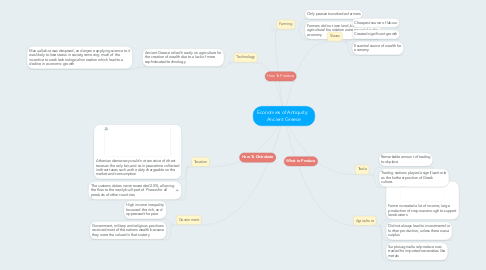Economies of Antiquity: Ancient Greece
por David Berhane

1. Technology
1.1. Ancient Greece relied heavily on agriculture for the creation of wealth due to a lack of more sophisticated technology
1.1.1. Manual labor was despised, and anyone applying science to it was likely to lose status in society, removing much of the incentive to seek technological innovation which lead to a decline in economic growth
2. Government
2.1. High income inequality favoured the rich, and oppressed the poor
2.2. Government, military and religious positions received most of the nations wealth because they were the valued in that society
3. Taxation
3.1. Athenian democracy could not conceive of direct taxes as the only fair, and so in peacetime collected indirect taxes such as the duty chargeable on the market and consumption
3.2. The customs duties never exceeded 2.5%, allowing the flow to the newly built port of Piraeus for all products of other countries.
4. How To Produce
5. How To Distrubute
6. Farming
6.1. Only peasants worked as farmers
6.2. Farmers did not own land, but their agricultural foundation were essential to the economy
7. What to Produce
8. Agriculture
8.1. Farmers created a lot of income; large production of crop was enough to support landowners
8.2. Did not always lead to investments for further production, unless there was a surplus
8.3. Surplus agricultural produce was traded for imported necessities like metals
9. Trade
9.1. Remarkable amount of trading took place
9.2. Trading stations played a significant role as the furthest position of Greek culture.
10. Slaves
10.1. Cheapest source of labour
10.2. Created significant growth
10.3. Essential source of wealth for economy



